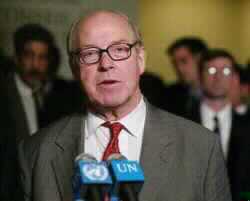Chief arms inspector Hans Blix will probably go to Baghdad between Jan. 18 and 20 for talks with Iraqi officials, presumably about a crucial report to the U.N. Security Council a week later, U.N. officials said. Iraq extended the invitation to Blix, in a letter dated last Saturday and reported by the Iraqi News Agency on Tuesday. The letter came from Gen. Amir al-Saadi, an adviser to Iraqi President Saddam Hussein, who said he wanted to review cooperation and discuss pending issues.
The invitation, according to diplomats and officials, was timed to discuss a pivotal report Blix must give to the Security Council on Jan. 27, his first full analysis on Iraq's cooperation with the inspectors and the accuracy of a 12,000-page weapons declaration its submitted last month.
"They probably want to hear about what to do before the 27th," said one diplomat.
While Blix's report will not be an automatic trigger for war, most diplomats believe it could lead to one in record time, depending on the reaction of the other 14 Security Council members. Not coincidentally, the date is an approximate time when the U.S. military would be ready to attack.
Mohamed ElBaradei, director-general of the Vienna-based International Atomic Energy Agency, was expected to go to Baghdad with Blix, the officials said.
Blix is executive chairman of the U.N. Monitoring, Verification and Inspection Commission, known as UNMOVIC, in charge of inspecting Iraq's chemical, biological and ballistic weapons programs. ElBaradei fields nuclear arms teams.
Both Blix and ElBaradei are scheduled to brief the council on Jan. 9, a follow-up to their initial Dec. 19 assessment of Iraq's declaration, at which time Blix pointed to several gaps in the document.
He said "an opportunity was missed" by Baghdad to come clean about new arms programs.
The United States called omissions in the declaration "another material breach" but stopped short of declaring the document a trigger for war.
The 15-nation Security Council has to "assess" any "material breach" of Iraq's declaration, based on reports from inspectors rather than just an analysis by the United States and its chief ally Britain. Otherwise Washington will have difficulty building a political or military coalition for an attack, particularly among Arab nations.
According to the Nov. 8 resolution, omissions in the declaration alone cannot alone trigger war but must be combined with other acts of non-cooperation with the inspectors, now in Iraq after a four-year hiatus.
There are currently some 110 inspectors in Iraq, 10 from the IAEA and the remainder from UNMOVIC.
Nearly 60,000 U.S. troops are deployed in the Gulf region and that number could soon double this month.
PHOTO CAPTION
Chief arms inspector Hans Blix will probably go to Baghdad between January 18 and 20, 2003 for talks with Iraqi officials, presumably about a crucial report to the U.N. Security Council a week later. Blix is seen speaking to the press at the UN in New York December 19, 2002. (Jeff Christensen/Reuters)
- Author:
& News Agencies - Section:
WORLD HEADLINES


 Home
Home Discover Islam
Discover Islam Quran Recitations
Quran Recitations Lectures
Lectures
 Fatwa
Fatwa Articles
Articles Fiqh
Fiqh E-Books
E-Books Boys & Girls
Boys & Girls  Hajj Rulings
Hajj Rulings Hajj Fatwas
Hajj Fatwas














